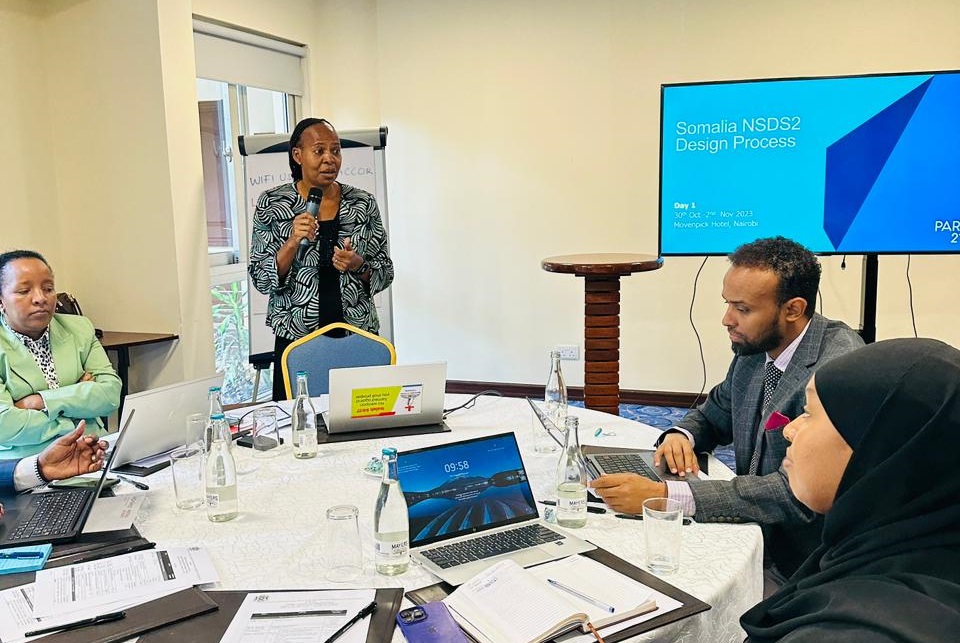Somalia
Strategical planning for improved national statistics on internal displacement
Background
In 2023, around 3 million people in Somalia were internally displaced due to conflict, insecurity, and climate-related disasters – representing about 30% of the population. [1] In addition to the impact on those directly affected, this displacement negatively impacts the social and economic conditions of host communities, undermines national peace efforts, and contributes to fragility in the Horn of Africa. Better IDP statistics has become a priority to support the Federal Government of Somalia in developing and implementing a National Durable Solutions Strategy (NDSS) [2] that aims to address the root causes and consequences of displacement.
To address this need, the Somalia National Bureau of Statistics (SNBS) developed an initial IDP Statistics Sectoral Plan in 2022. In 2023, IDP Statistics priorities were integrated into the second National Strategy for the Development of Statistics (NSDSII) [3] and the existing technical working group on migration statistics was expanded to cover displacement thereby enhancing statistical coordination.
Including IDP statistics into the NSDS
Somalia’s NSDSII, validated in October 2023, will cover the period of 2024-2029. As it encompasses the overall priorities for statistical production over the next six years, the incorporation of IDP statistics within its implementation plan is significant.
IDP Statistics have been included in the NSDSII is several ways including:
- Steps to enhance coordination through Technical Working Groups, the development of MoU with donors and biannual meetings between SNBS and the Durable Solution Unit (DSU)/Durable Solutions Secretariat (DSS) of the Ministry of Planning, Investment and Economic Development (MOPIED). [4]
- Work to improve data availability and quality through improved IDP identification, inclusion in national surveys (the Multiple Indicator Cluster Surveys (MICS), Demographic and Health Surveys (DHS) and Labor Force Surveys (LFS) are highlighted), and use of civil registration data.
Whilst the sheer magnitude of displacement in Somalia, combined with existing data gaps, provided a strong incentive to include IDP statistics as a priority in the NSDSII, it was further facilitated by strong leadership within key institutions and departments and the availability of concrete recommendations from the 2022 draft IDP Statistics Sectoral Plan.
Furthermore, regional and international engagements through bodies like IGAD and EGRISS facilitated exposure of SNBS staff to available resources and experiences from other countries, that also contributed to this milestone.
“Producing IDPs statistical data is very significant in Somalia, and the Somali National Bureau of Statistics has taken a leading role by implementing the IRIS and coordinating with stakeholders, within and beyond the government”.
– Sharmarke Mohamed Farah, Director General of the Somali National Bureau of Statistics
Expanding existing coordination platforms to address displacement
To enhance coordination around IDP statistics and better connect it to broader migration statistics endeavours, SNBS took advantage of an existing coordination structures – the Technical Working Group on Migration Statistics, created in 2022 – and expanded it to cover both migration and displacement.
During 2023 participants were officially nominated from several government bodies to take part in the group, including the SNBS (as the chair), the Ministry of Planning, Investment and Economic Development, the Immigration and Citizenship Agency, the Ministry of Labour and Social Affairs, the National Commission for Refugees and IDPs, the Ministry of Foreign Affairs and International Cooperation and the Office of the Special Envoy for Migrants’ and Children’s Rights.
The Working Group was established following a consultation workshop supported by IOM, and aims to improve migration and displacement data production, analysis, sharing, usage and dissemination between relevant ministries, departments, and agencies.
It also provides a platform for capacity development through international cooperation, with a study visit to Statistics South Africa planned for 2024 and regular engagement with IGAD’s regional migration statistics working group.

Validation workshop 2nd NSDS-II in Kenya in 2023 | Source: SNBS
The use of the International Recommendations
The International Recommendations on IDP Statistics (IRIS) provided a foundational entry point for the development of the IDP Statistics Sectoral Plan (the development of which was supported by EGRISS through the Joint IDP Profiling Service), which then directly informed IDP-related priorities included in the NSDSII. Almost all parts of the IRIS have therefore been utilized in the case of Somalia, including the IDP statistical framework, data source recommendations, proposed indicators, and statistical coordination practice. SNBS’ involvement in regional and international engagements through bodies like the Intergovernmental Authority on Development.
Conclusion
By incorporating IDP statistics into the NSDS, Somalia emerges as a pioneering country example for EGRISS, despite having a young NSS and a relatively recently established independent NSO. This case study illustrates an important example of using the International Recommendations to inform national statistical plans, enabled by clear NSO leadership and commitment.
Looking ahead, SNBS is advocating for the validation of the IDP Statistics Sectoral Plan and will work closely with key Federal Government Ministries, regional, and international partners to achieve this. Moreover, they are working to include IDPs into the MICS-7 and are coordinating with MoPIED on durable solutions data.
[1] See: Country overview – Somalia (UNHCR).
[2] See: The National Durable Solutions Strategy (2020 – 2024) (The Federal Government of Somalia).
[3] See: National Strategy for the Development of Statistics (NSDSII) 2024 – 2029 (The Federal Government of Somalia).
[4] See: Durable Solutions Unit, Ministry of Planning and International Cooperation (The Federal Government of Somalia).
